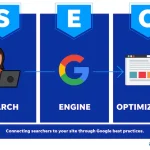Your Comprehensive Guide
SEO, or Search Engine Optimization, is a fundamental aspect of digital marketing that plays a pivotal role in enhancing a website’s visibility and driving organic traffic from search engines. In this comprehensive guide, we will delve into the world of SEO, exploring its intricacies, SEO Basics Work Guide, and how it fundamentally works to help websites thrive in the vast online landscape.
https://moz.com/beginners-guide-to-seo
Table of Contents:
- Introduction
- What is SEO?
- Why SEO Matters:
- How Search Engines Work:
- The Three Pillars of SEO:
- The Role of Keywords:
- Crafting High-Quality Content:
- Optimizing On-Page Elements:
- The Power of Backlinks:
- Technical SEO:
- Mobile-Friendly Optimization:
- Measuring SEO Success:
- Common SEO Mistakes:
- Conclusion:
- Frequently Asked Questions About SEO
Introduction:
In the fast-paced digital era, where the internet is flooded with websites vying for attention, SEO emerges as the knight in shining armor for businesses and content creators. It’s not just about ranking higher on search engines; it’s about making your digital presence resonate with your target audience. SEO Basics Work Guide: What is SEO? is your compass to navigate through the ever-evolving landscape of search engine optimization.
What is SEO?
SEO, in its essence, is the strategic art of optimizing a website to achieve higher visibility on search engine results pages (SERPs). When a user enters a query into a search engine, the algorithms scan and rank websites based on their relevance and authority. SEO involves tailoring your website’s content, structure, and technical aspects to align with these algorithms, ensuring that your website appears prominently when users search for relevant keywords.
Why SEO Matters:
In the vast expanse of the digital realm, where competition is fierce, SEO serves as the lighthouse guiding users to your online presence. Imagine having a beautifully designed website with compelling content but no visitors. SEO bridges that gap, attracting organic traffic and driving potential customers to your offerings. It’s not just about clicks; it’s about meaningful engagement and conversion.
How Search Engines Work:
Ever wondered how search engines magically fetch results from the web in a matter of seconds? The process involves crawling, indexing, and ranking. Search engine bots crawl through web pages, creating an index of the content they find. When a user searches, the engine ranks these indexed pages based on factors like relevance and authority, presenting the most fitting results. SEO ensures your website aligns with these ranking factors.
The Three Pillars of SEO:
SEO stands on three sturdy pillars: On-Page, Off-Page, and Technical. On-page SEO deals with optimizing individual web pages with relevant content, proper HTML tags, and keyword usage. Off-page SEO focuses on building a website’s authority through backlinks and social signals. Technical SEO emphasizes enhancing the website’s technical aspects, such as site speed, mobile-friendliness, and structured data.
The Role of Keywords:
Keywords are the compass users use to navigate the vast digital landscape. They are the words and phrases users type into search engines to find solutions. Effective keyword research and usage are pivotal in SEO. By strategically integrating relevant keywords into your content, you increase the chances of your website appearing when users search for those terms.
Crafting High-Quality Content:
“Content is king” is not just a catchphrase; it’s a cardinal rule of SEO. High-quality, informative, and engaging content captivates users and keeps them on your website longer. This reduces bounce rates and signals to search engines that your content is valuable. Consistently creating content that addresses users’ needs and concerns establishes your website as a reliable resource.
Optimizing On-Page Elements:
On-page SEO involves optimizing individual web pages to rank higher and earn organic traffic. This includes crafting compelling meta titles and descriptions, using proper heading tags (H1, H2, H3), and structuring content logically. These elements not only improve user experience but also provide search engines with a clear understanding of your content’s context.
The Power of Backlinks:
Backlinks, also known as inbound links, are links from other websites to yours. They serve as endorsements, indicating to search engines that your content is valuable and credible. However, not all backlinks are created equal. High-quality, authoritative backlinks hold more weight and can significantly impact your website’s ranking.
Technical SEO:
Behind the scenes, technical SEO lays the groundwork for a seamless user experience. It involves optimizing site speed, ensuring mobile-friendliness, and implementing structured data markup. A well-structured website that loads quickly and functions smoothly enhances user satisfaction, indirectly influencing your website’s ranking.
Mobile-Friendly Optimization:
In an era dominated by smartphones and tablets, mobile-friendliness is no longer an option; it’s a necessity. Mobile optimization ensures that your website is accessible and functional on various devices. Mobile-responsive design, fast loading times, and intuitive navigation contribute to a positive user experience, which search engines reward with better rankings.
Measuring SEO Success:
How do you know if your SEO efforts are bearing fruit? This is where metrics come into play. Tracking key performance indicators (KPIs) like organic traffic, click-through rates (CTR), conversion rates, and keyword rankings provide insights into your strategy’s effectiveness. Regular analysis allows you to fine-tune your approach and adapt to changing trends.
Common SEO Mistakes:
Even the most well-intentioned SEO efforts can go awry if you fall into common pitfalls. These include keyword stuffing, neglecting mobile optimization, ignoring backlink quality, and overlooking technical issues. Being aware of these mistakes empowers you to sidestep them and make the most of your SEO endeavors.
Conclusion:
In the realm of digital marketing, mastering SEO is akin to wielding a powerful tool that unlocks unparalleled visibility and engagement. This SEO Basics Work Guide: What is SEO? has illuminated the path from understanding the fundamentals to optimizing various aspects of your website. As you embark on your SEO journey, remember that while algorithms may evolve, the core principles of delivering value to users will always remain paramount.
Frequently Asked Questions About SEO
- Q: How long does it take to see SEO results?
A: SEO is a gradual process. You might start noticing improvements in a few months, but significant results often take six months to a year or more. - Q: Can I do SEO on my own, or should I hire a professional?
A: While basic SEO can be tackled independently, hiring a professional can provide in-depth expertise and save time. - Q: Is link building still important for SEO?
A: Yes, but the focus has shifted from quantity to quality. Acquiring authoritative and relevant backlinks is key. - Q: Does social media activity impact SEO?
A: While social signals are not direct ranking factors, they can indirectly influence visibility by driving traffic and engagement. - Q: Is SEO a one-time effort?
A: No, SEO requires ongoing maintenance and adaptation to algorithm changes and industry trends. - Q: Can images and videos be optimized for SEO?
A: Absolutely. Properly optimized images and videos enhance user experience and can appear in search results, driving additional traffic.
For more information or do you have any relevant questions feel free to Click Here






